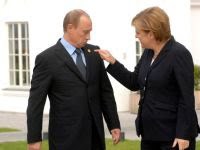Year of Russia in Germany, Germany in Russia
by Olivia Kroth
After the high and mighty talks about "human rights" records found wanting in Russia, the German delegation finally got their act together, remembered why they had come to Moscow in the first place, sat down to talk business with their Russian partners. They put the lid on the pot by signing contracts worth billions.
Heaven be thanked, pragmatism prevailed. The German high flyers came down to earth and back to their senses just in time, so they would not have to fly home with empty pockets and luggage.
President Vladimir Putin, with a smile, thanked the ladies and gentlemen from the Bundesrepublik Deutschland "for their constructive and fruitful cooperation."
Tongue in cheek, he pointed out that the Russian and German participants of the Petersburg Dialogue in Moscow "spoke in detail about a widest variety of topical issues, ranging from economy and finance to cooperation in security and culture, focusing on 'achieving visible results' that benefit both countries and nations."
Although the negotiations were not easy, they had a positive outcome. "Our trade and economic relations are developing well. It suffices to mention that last year, in 2011, bilateral trade grew by 37 percent to a record $72 billion. This year, our trade continues to gain momentum and has already increased by 5.6 percent with respect to the previous year," President Putin pointed out.
Obviously, these numbers beat such lofty ideas as democracy, human rights and freedom for the rioting Pussies. In his delicate, subtle way for which he is famous, the Russian President told the Germans that it was to their own best interests if they cooperated with the Russian Federation, since they need oil and gas from Russia.
In the President's elegant, rather oblique wording, it sounded like this: "I must say that it is well-known that Germany is becoming a major, important hub for the distribution of Russian energy resources to the rest of Europe."
Among other topics, the Russian President also mentioned that the Russian-German Year of Friendship has begun. "This summer, the Year of Germany in Russia and the Year of Russia in Germany, was launched under the symbolic motto, "Building the Future Together." The agenda of these events provides that in April 2013, Russia will act as Germany's main partner in the world-famous Hannover Messe. "In turn, we would be very pleased to welcome Ms Federal Chancellor as the guest of honour at the St Petersburg International Economic Forum that will take place in June 2013."
At the final press conference, the Pussy Riot topic popped up, of course, how else could it be? Some journalists seem to have nothing else to write about in their "Käseblättchen" (cheese news), but scandalmongering, because that is what sells best.
President Putin, well versed in German law, answered, "I just wanted to point out that when we discuss certain things, we have to understand all sides of the issue. As for offending religious feelings and insulting the Church, as far as I know, it is a criminal offense in Germany that is punishable with imprisonment of up to three years."
As far as the question of Syria and Palestine is concerned, both sides admitted that they had approached their positions, but had not reached any consensus yet. How could they, when the German side is not free to speak their own mind, but must talk the talk and walk the walk according to NATO's wishes. Strapped into a straightjacket, there is very little leeway for free movement.
The evaluation of the Euro sounded strange on both sides. President Putin expressed his confidence once more, as he has done many times, that the euro was a good currency and would eventually recover from its present day woes. Russia still holds 40 percent of its foreign reserves in euros, which seems like a trapeze act. Hopefully, the trapez artist has spanned a safety net underneath?
Chancelor Angela Merkel remarked that the European Union was going through difficult times. Yes indeed, it is falling apart. But Mrs. Merkel prefered to remain optimistic:
"Every crisis eventually gives rise to new opportunities and prospects. ... The euro has proved itself as a very stable currency. ... The euro has been stable, although there have been variations in the individual member states. The euro will help us achieve successful European growth, and cooperation between the Eurozone and Russia is an important direction for the future."
The last sentence might be true, but the rest sounds more like wishful thinking. Successful European growth? Where? When? With Greece and Portugal bankrupt, Spain and Italy in a downwards spiral, the largest three French banks (Société Générale, Crédit Agricole, Banque Paribas) technically bankrupt so that the Bank of China will not deal with them any more, how will successful European growth be achieved?
"Ihr Wort in Gottes Ohr", as the Germans say. May the German Chancellor's words reach God's ear.
The full transcript of the final press conference in Moscow can be read on the President of Russia's website:
http://eng.kremlin.ru/transcripts/4645
Prepared for publication by:
Lisa Karpova
Pravda.Ru

Subscribe to Pravda.Ru Telegram channel, Facebook, RSS!

